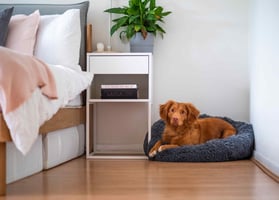Crate training your beloved pup can be a stressful experience, especially if they are prone to...
How to Get Your Dog to Stop Snoring
Snoring can be a nuisance for both you and your beloved pet, but it can be managed. This article will provide guidance on how to get your dog to stop snoring, ranging from home remedies to medical treatments. With the right knowledge, you can help your pup get the rest they need while still enjoying a peaceful night’s sleep.
Common Causes of Dog Snoring
Snoring in dogs is most commonly caused by obstruction in the upper airway. This can be due to a variety of factors, such as allergies, obesity, or even the size or shape of your pup’s head. Other causes of snoring include sinus infections, nasal polyps, or tumors. In some cases, snoring can also be caused by airway collapse, which is a condition that makes it harder for your pup to breathe while they sleep.
It’s important to determine the cause of your dog’s snoring before attempting to treat it. A visit to the vet is the best way to accurately diagnose the underlying cause and ensure your pup gets the treatment they need.
Home Remedies for Dog Snoring
If you’d like to try a few home remedies before visiting the vet, here are some tips to help reduce your pup’s snoring:
- Check your pup’s sleeping environment: Make sure your pup is sleeping in a cool, quiet, and comfortable place. This can help reduce the amount of snoring they do.
- Monitor their diet: Obesity can contribute to snoring, so you should make sure your pup is eating a healthy, balanced diet.
- Clean their airways: Make sure to keep your pup’s airways clear of debris and allergens by regularly cleaning their nose, eyes, and ears.
- Elevate their head: Elevating your pup’s head while they sleep can help reduce snoring. This is because gravity helps keep their airways open.
- Try a muzzle: If your pup’s snoring is particularly loud, you can try using a muzzle to help keep their airways open while they sleep.
Medical Treatments for Dog Snoring
If your pup’s snoring persists after trying the home remedies above, you may need to consider medical treatments. Depending on the underlying cause of your pup’s snoring, your vet may recommend one or more of the following:
- Surgical correction: If your pup’s snoring is caused by a physical obstruction in their airway, surgery may be necessary to correct it.
- Medication: Your vet may prescribe medication to help reduce inflammation or allergies that may be causing your pup’s snoring.
- Oral appliances: If your pup has a collapsed airway, your vet may recommend an oral appliance to help keep their airways open while they sleep.
It’s important to note that some medical treatments may carry risks and side effects. Before opting for any of the above treatments, make sure you discuss the pros and cons with your vet.
Conclusion
Snoring in dogs can be a nuisance for both you and your pup, but it doesn’t have to be. With the right knowledge, you can help your pup get the rest they need while still enjoying a peaceful night’s sleep. In this article, we’ve discussed the common causes of dog snoring and provided home remedies and medical treatments that can help reduce your pup’s snoring. If your pup’s snoring persists, make sure to consult your vet for the best course of action.



